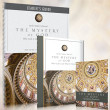Why Evil and Suffering Don’t Disprove God
by Brandon Vogt
Filed under The Existence of God

NOTE: Today's post is in response to Steven Dillon's post, "Why I Don't Think God Exists." I’d like to begin responding to Steven Dillon’s guest post on God’s existence by complimenting his thoughtful and candid writing. I especially appreciated his opening paragraph where, with great vulnerability, Steven acknowledged that he wished God existed. Some atheists desire just the opposite. The philosopher Thomas Nagel admitted in his book, The Last Word: “I want atheism to... Read More
Hell and God’s Goodness
by Dr. Dennis Bonnette
Filed under Hell

Although this article will address the content of certain theological doctrines, it is written from a purely philosophical perspective. This is the same method used consistently in my book, Origin of the Human Species, in which I examine how evolutionary theory comports with divine revelation and philosophy. What characterizes philosophical analysis of theological doctrine is that reason alone is the method employed. Thus, while the philosopher as such cannot say whether the Trinity... Read More
How Aquinas’s First Mover is Also Universal Governor
by Dr. Dennis Bonnette
Filed under God's Nature

This post aims at better understanding how God interacts with creatures, not primarily at proving his existence. Central objections to God’s existence are that (1) his nature is self-contradictory and/or (2) his relation to creatures is somehow impossible, as in, for example, the problem of evil that I have addressed here previously. In other posts, I have argued that God is the source of all “new existence” that appears in the world every moment it progresses through time.... Read More
Was Bertrand Russell Right About Thomas Aquinas?
by Joe Tulloch
Filed under Philosophy

Bertrand Russell was one of the most prominent philosophers of the 20th century, and an outspoken skeptic. His bestselling book A History of Western Philosophy (which was cited as one of the reasons for his 1950 Nobel Prize in Literature) contains a short chapter in which he examines St Thomas Aquinas’ life and work, concluding with the following, damning remark: There is little of the true philosophic spirit in Aquinas. He does not, like the Platonic Socrates, set out to follow wherever... Read More
How God’s Nature Is Known: The Three-Fold Way
by Dr. Dennis Bonnette
Filed under God's Nature, The Existence of God

Acceptance of God’s existence is conditioned for many on whether or not a convincing proof thereof can be presented to them. But for others, it is not a problem of proving that God exists, but rather questions about whether the concept of a Supreme Being is even coherent. Many atheists or agnostics simply find the classical conception of God to be unintelligible. God is said to be omnipotent, omniscient, eternal, all good, omnipresent, and so forth. But to many it is not at all... Read More
Why Does God Allow Natural Disasters?
by Stephen Edwards
Filed under The Problem of Evil

Natural evil consists of any deformity within the natural world that leads to suffering such as: natural disasters, diseases, predatorial animals, and bodily weaknesses. This article will argue that natural evil can be plausibly explained by appealing to the free will of angels. According to traditional Judeo-Christian thought, God created angels and gave them the freedom to choose between good and evil. Furthermore, it is possible that the angels’ freedom could extend to... Read More
The Power and Danger of Bayes’ Theorem
by Brandon Vogt
Filed under Christianity and Science, The Existence of God

I've noted many flaws and points of confusion in Sean Carroll's new book, The Big Picture: On the Origins of Life, Meaning, and the Universe Itself (Dutton, 2016), but one of the strongest sections is its explanation of Bayes' Theorem. The Theorem is a quantitive way to express confidence in certain beliefs. It requires assigning credences (or probabilities) to events or statements, and then tweaking them based on new information. For example, suppose you're wondering whether a randomly... Read More
Is God Necessary for Human Happiness?
by Karlo Broussard
Filed under God, Man

Christians have always heard that only God can make them happy. In fact, some Bible translations render Psalm 16:2 as, "You are my God. My happiness lies in you alone." But an atheist would say, “I don’t need God to be happy. I can get along just fine without him.” It is true that an atheist can experience kinds of happiness without living for God. But if an atheist persistently and culpably rejects God, Fr. Robert Spitzer argues in a new book, he will not be able to experience... Read More
Is the Modal Ontological Argument for God a Sound Proof?
by Brandon Vogt
Filed under The Existence of God

Over the coming weeks, instead of exclusively posting articles asserting and defending a particular view, we'd also like to feature open-ended discussion posts that lay on the table a popular argument for or against God and then invite us to discuss it together, as a community, in the comment boxes. Today, we'll begin with Alvin Plantinga's modal ontological argument for God. Plantinga is one of the most respected and influential philosophers today. He's the John A. O'Brien Professor of... Read More
The Mystery of God (Sample + DVD Giveaway!)
by Brandon Vogt
Filed under God

Atheism is on the rise. Skeptical thinkers like Richard Dawkins, Christopher Hitchens, and Sam Harris vigorously attack belief in God as irrational or, even worse, dangerous. The so-called New Atheism has attracted millions of young people thanks to bestselling books such as The God Delusion and God Is Not Great. In The Mystery of God, a new six-part film series and study program, Strange Notions contributor Bishop Robert Barron responds to this trend by teaching into the rich intellectual... Read More






